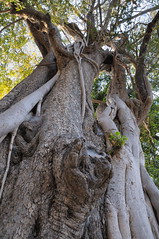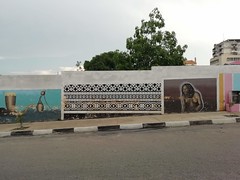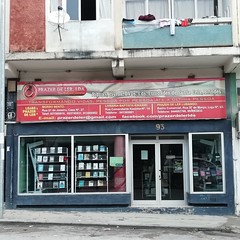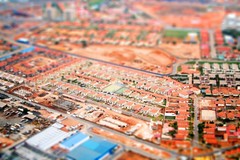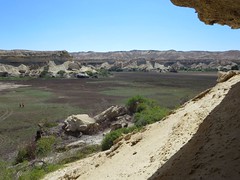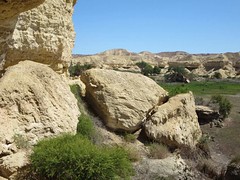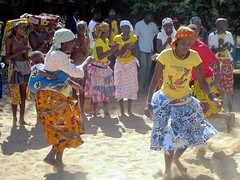 Angola
Angola
Angola (English: /æŋˈɡlə/; Portuguese: [ɐ̃ˈɡɔlɐ]; Kongo: Ngola, Kongo: [ŋɔla]), officially the Republic of Angola (Portuguese: República de Angola, Kongo: Repubilika ya Ngola), is a country located on the west-central coast of Southern Africa. It is the second-largest Lusophone (Portuguese-speaking) country in both total area and population (behind Brazil in both cases), and is the seventh-largest country in Africa. It is bordered by Namibia to the south, the Democratic Republic of the Congo to the north, Zambia to the east, and the Atlantic Ocean to the west. Angola has an exclave province, the province of Cabinda, that borders the Republic of the Congo and the Democratic Republic of the Congo. The capital and most populous city is Luanda.
Angola has been inhabited since the Paleolithic Age. Its formation as a nation-state originates from Portuguese colonisation, which initially began with coastal settlements and trading posts founded in the 16th century. In the 19th century, European settlers gradually began to establish themselves in the interior. The Portuguese colony that became Angola did not have its present borders until the early 20th century, owing to resistance by native groups such as the Cuamato, the Kwanyama and the Mbunda.
After a protracted anti-colonial struggle, Angola achieved independence in 1975 as a Marxist–Leninist one-party Republic. The country descended into a devastating civil war the same year, between the ruling People's Movement for the Liberation of Angola (MPLA), backed by the Soviet Union and Cuba, the insurgent National Union for the Total Independence of Angola, an originally Maoist and later anti-communist group supported by the United States and South Africa, and the militant organization National Liberation Front of Angola, backed by Zaire. The country has been governed by MPLA ever since its independence in 1975. Following the end of the war in 2002, Angola emerged as a relatively stable unitary, presidential constitutional republic.
Angola has vast mineral and petroleum reserves, and its economy is among the fastest-growing in the world, especially since the end of the civil war; however, economic growth is highly uneven, with most of the nation's wealth concentrated in a disproportionately small part of the population; the largest investment and trade partners are China and the United States. The standard of living remains low for most Angolans; life expectancy is among the lowest in the world, while infant mortality is among the highest. Since 2017, the government of João Lourenço has made fighting corruption its flagship, so much so that many individuals of the previous government are either jailed or awaiting trial. Whilst this effort has been recognised by foreign diplomats to be legitimate, some skeptics see the actions as being politically motivated.
Angola is a member of the United Nations, OPEC, African Union, the Community of Portuguese Language Countries, and the Southern African Development Community. , the Angolan population is estimated at 32.87 million. Angola is multicultural and multiethnic. Angolan culture reflects centuries of Portuguese influence, namely the predominance of the Portuguese language and of the Catholic Church, intermingled with a variety of indigenous customs and traditions.
Etymology
The name Angola comes from the Portuguese colonial name ('Kingdom of Angola'), which appeared as early as Paulo Dias de Novais's 1571 charter. The toponym was derived by the Portuguese from the title held by the kings of Ndongo and Matamba. Ndongo in the highlands, between the Kwanza and Lucala Rivers, was nominally a possession of the Kingdom of Kongo, but was seeking greater independence in the 16th century.
History
Portuguese colonization
Portuguese explorer Diogo Cão reached the area in 1484. The previous year, the Portuguese had established relations with the Kongo, which stretched at the time from modern Gabon in the north to the Kwanza River in the south. The Portuguese established their primary early trading post at Soyo, which is now the northernmost city in Angola apart from the Cabinda exclave. Paulo Dias de Novais founded São Paulo de Loanda (Luanda) in 1575 with a hundred families of settlers and four hundred soldiers. Benguela was fortified in 1587 and became a township in 1617.
The Portuguese established several other settlements, forts and trading posts along the Angolan coast, principally trading in Angolan slaves for plantations. Local slave dealers provided a large number of slaves for the Portuguese Empire, usually in exchange for manufactured goods from Europe.
This part of the Atlantic slave trade continued until after Brazil's independence in the 1820s.
Despite Portugal's territorial claims in Angola, its control over much of the country's vast interior was minimal. In the 16th century Portugal gained control of the coast through a series of treaties and wars. Life for European colonists was difficult and progress was slow. John Iliffe notes that "Portuguese records of Angola from the 16th century show that a great famine occurred on average every seventy years; accompanied by epidemic disease, it might kill one-third or one-half of the population, destroying the demographic growth of a generation and forcing colonists back into the river valleys".
During the Portuguese Restoration War, the Dutch West India Company occupied the principal settlement of Luanda in 1641, using alliances with local peoples to carry out attacks against Portuguese holdings elsewhere. A fleet under Salvador de Sá retook Luanda in 1648; reconquest of the rest of the territory was completed by 1650. New treaties with the Kongo were signed in 1649; others with Njinga's Kingdom of Matamba and Ndongo followed in 1656. The conquest of Pungo Andongo in 1671 was the last major Portuguese expansion from Luanda, as attempts to invade Kongo in 1670 and Matamba in 1681 failed. Colonial outposts also expanded inward from Benguela, but until the late 19th century the inroads from Luanda and Benguela were very limited. Hamstrung by a series of political upheavals in the early 1800s, Portugal was slow to mount a large scale annexation of Angolan territory.
The slave trade was abolished in Angola in 1836, and in 1854 the colonial government freed all its existing slaves. Four years later, a more progressive administration appointed by Portugal abolished slavery altogether. However, these decrees remained largely unenforceable, and the Portuguese depended on assistance from the British Royal Navy to enforce their ban on the slave trade. This coincided with a series of renewed military expeditions into the bush.
By the mid-nineteenth century Portugal had established its dominion as far north as the Congo River and as far south as Mossâmedes. Until the late 1880s, Portugal entertained proposals to link Angola with its colony in Mozambique but was blocked by British and Belgian opposition. In this period, the Portuguese came up against different forms of armed resistance from various peoples in Angola.
The Berlin Conference in 1884–1885 set the colony's borders, delineating the boundaries of Portuguese claims in Angola, although many details were unresolved until the 1920s. Trade between Portugal and its African territories rapidly increased as a result of protective tariffs, leading to increased development, and a wave of new Portuguese immigrants.
Between 1939 and 1943 the Portuguese army carried out operations against the nomadic Mucubal people, accused of rebellion, which led to the death of half their population. The survivors were incarcerated in concentration camps, sent to forced labor camps, where the great majority of them perished due to the brutality of the work system, undernourishment and executions.
Angolan independence
Under colonial law, black Angolans were forbidden from forming political parties or labour unions. The first nationalist movements did not take root until after World War II, spearheaded by a largely Westernised and Portuguese-speaking urban class, which included many mestiços. During the early 1960s they were joined by other associations stemming from ad hoc labour activism in the rural workforce. Portugal's refusal to address increasing Angolan demands for self-determination provoked an armed conflict, which erupted in 1961 with the Baixa de Cassanje revolt and gradually evolved into a protracted war of independence that persisted for the next twelve years. Throughout the conflict, three militant nationalist movements with their own partisan guerrilla wings emerged from the fighting between the Portuguese government and local forces, supported to varying degrees by the Portuguese Communist Party.
The National Front for the Liberation of Angola (FNLA) recruited from Bakongo refugees in Zaire. Benefiting from particularly favourable political circumstances in Léopoldville, and especially from a common border with Zaire, Angolan political exiles were able to build up a power base among a large expatriate community from related families, clans, and traditions. People on both sides of the border spoke mutually intelligible dialects and enjoyed shared ties to the historical Kingdom of Kongo. Though as foreigners skilled Angolans could not take advantage of Mobutu Sese Seko's state employment programme, some found work as middlemen for the absentee owners of various lucrative private ventures. The migrants eventually formed the FNLA with the intention of making a bid for political power upon their envisaged return to Angola.
A largely Ovimbundu guerrilla initiative against the Portuguese in central Angola from 1966 was spearheaded by Jonas Savimbi and the National Union for the Total Independence of Angola (UNITA). It remained handicapped by its geographic remoteness from friendly borders, the ethnic fragmentation of the Ovimbundu, and the isolation of peasants on European plantations where they had little opportunity to mobilise.
During the late 1950s, the rise of th…
Looking for places related to Angola?
Those are other destinations to find places related to Angola:







